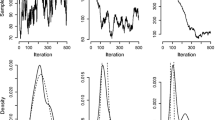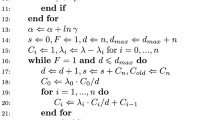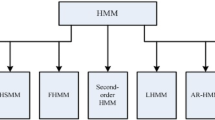Abstract
The literature of Markov chains has recently focused on modeling multiple categorical data sequences. The usual procedure for handling these multivariate Markov chains (MMC), with \(m\) categorical data and \(s\) states, consists of expanding the state space by considering \(m^{s}\) new states. This model rapidly becomes intractable even with moderate values of \(m\) and \(s\) due to the excessive number of parameters to estimate. Ching and Fung (2002) found a way to cope with the intractability of the conventional MMC. They also suggested a method of estimation that proved to be inefficient. Zhu and Ching (2010) proposed another method of estimation based on minimizing the prediction error with equality and inequality restrictions. However, both these procedures treat the estimation problem as a mechanic method, without addressing the statistical inference problem. In this article we try to overcome this shortcoming and, at the same time, we propose a new approach to estimate MMC (under Ching et al. hypothesis) which avoids imposing equality and inequality restrictions on the parameters. We illustrate the model and the estimation method with two applications on financial time series data.
Similar content being viewed by others
References
Billingsley P (1999) Convergence of probability measures. John Wiley, New York
Ching W, Fung E (2002) A multivariate Markov chain model for categorical data sequences and its applications in demand predictions. J Manag Math 13:187–199
Ching W, Ng M (2006) Markov chains: models, algorithms and applications, series: international series in operations research & management science, vol 83. Springer, New York
Faraz A, Saniga E (2011) A unification and some corrections to Markov chain approaches to develop variable ratio sampling scheme control charts. Stat Papers 52:799–811
Fung E, Siu T (2012) A flexible Markov chain approach for multivariate credit ratings. Comput Econ 39:135–143
Hayashi F (2000) Econometrics. Princeton University Press, Princeton
Kijima M, Komoribayashi K, Suzuki E (2002) A multivariate Markov model for simulating correlated defaults. J Risk 4:1–32
Kosorok M (2000) Monte Carlo error estimation for multivariate Markov chains. Stat Probab Lett 46:85–93
Maskawa J (2003) Multivariate Markov chain modeling for stock markets. Physica A 324:317–322
McDonnell J, Goverde A, Rutten F, Vermeiden J (2002) Multivariate Markov chain analysis of the probability of pregnancy in infertile couples undergoing. Assist Reprod 17:103–106
McQueen G, Thorley S (1991) Are stock returns predictable? a test using Markov chains. J Financ 46:239–263
Pegram G (1980) An autoregressive model for multilag Markov chains. J Appl Probab 17:350–362
Raftery A (1985) A model for high-order Markov chains. J Royal Stat Soc Series B 47:528–539
Siu T, Ching W, Fung S (2005) On a multivariate Markov chain model for credit risk measurement. Quant Financ 5(6):543–556
Tsai T, Yen W (2011) Exponentially weighted moving average control charts for three-level products. Stat Papers 52:419–429
Yang H, Li Y, Lu L, Qi R (2011) First order multivariate Markov chain model for generating annual weather data for Hong Kong. Energy Build 43:2371–2377
Zhu D, Ching W (2010) A new estimation method for multivariate Markov chain model with application in demand predictions. The 3rd international conference on business intelligence and financial engineering (BIFE), Hong Kong.
Acknowledgments
This research was supported by the Fundação para a Ciência e a Tecnologia (FEDER/POCI 2010 program)
Author information
Authors and Affiliations
Corresponding author
Rights and permissions
About this article
Cite this article
Nicolau, J., Riedlinger, F.I. Estimation and inference in multivariate Markov chains. Stat Papers 56, 1163–1173 (2015). https://doi.org/10.1007/s00362-014-0630-6
Received:
Revised:
Published:
Issue Date:
DOI: https://doi.org/10.1007/s00362-014-0630-6
Keywords
- Multivariate Markov chains
- Nonlinear least squares
- Predictability of investment recommendations
- Statistical inference




